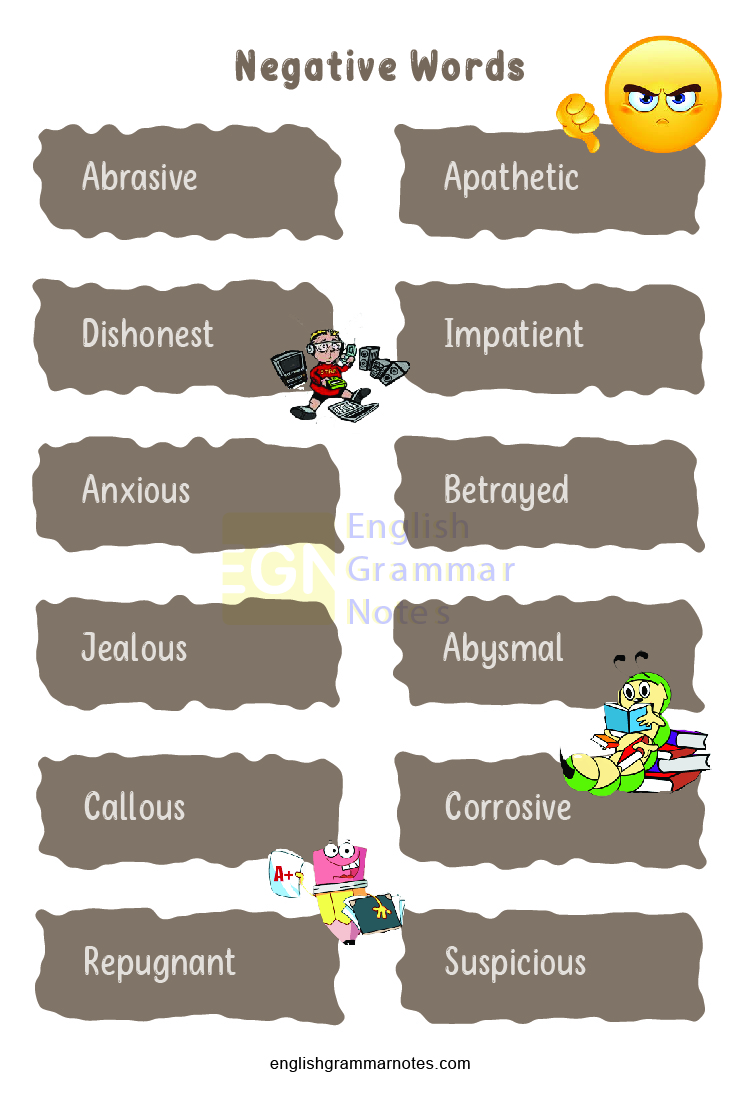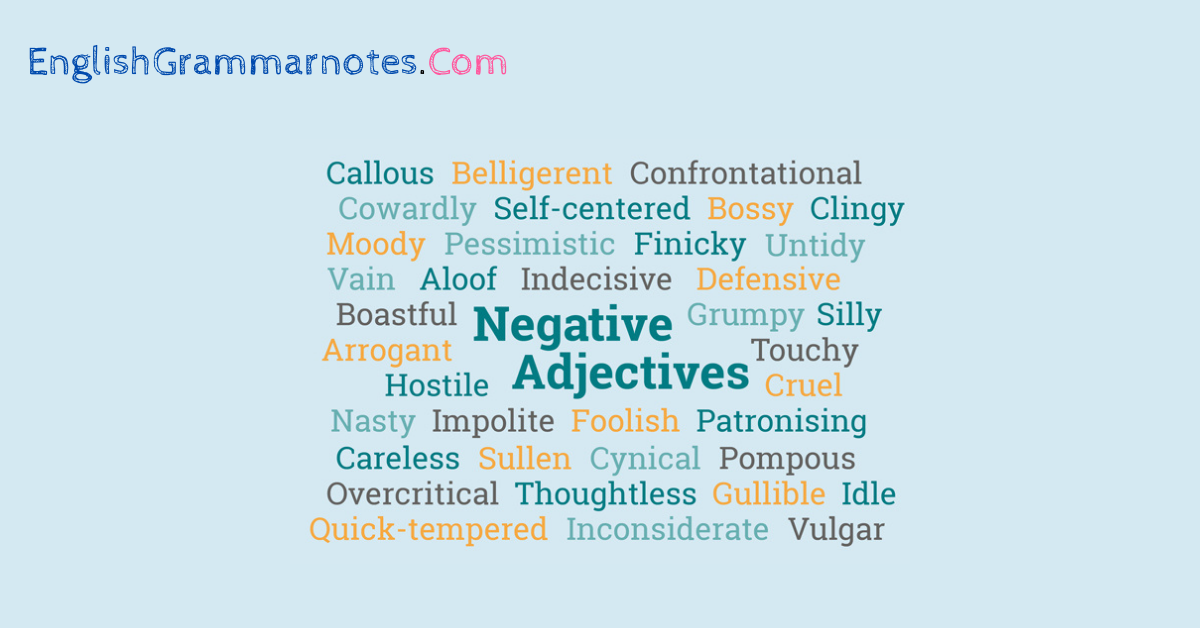Words can be very powerful. While positive words boost your confidence and self-esteem, negative words also have long-lasting effects. So it is important that you make use of negative words wisely. Negative words are used to describe something that is unpleasant. Frustration or dissatisfaction can also be signified using negative words.
- Common Negative Words | Negative Vocabulary Word List
- Negative Adjectives in English | Negative Words Examples You can Use
- Power of Negative Words
- Negative Words to Avoid while Writing
- What are Negative Words?
- What are some of the commonly used negative words?
- What are the effects of negative words?
Common Negative Words | Negative Vocabulary Word List
Given below is a list of the common negative words used in everyday context:
- negative pronouns – nothing, neither, nowhere, no one, nobody, none.
- negative verbs – isn’t, shouldn’t, wasn’t, weren’t, won’t, wouldn’t, aren’t, can’t, couldn’t, doesn’t, don’t.
- negative adverbs – not, never, scarcely, barely, hardly, no.
- Negative adjectives – dishonest, impatient, embarrassed, disappointed, etc
The first three categories are considered to be negative as they mean the opposite of their affirmative parts. While negative words like bad, ugly, stupid, etc are used to intentionally hurt a person, these words do not insult or degrade an individual.
Negative Adjectives in English | Negative Words Examples You can Use
Given below is a list of adjectives that carry a negative meaning:
- Abrasive
- Apathetic
- Controlling
- Dishonest
- Impatient
- Anxious
- Betrayed
- Disappointed
- Embarrassed
- Jealous
- Abysmal
- Bad
- Callous
- Corrosive
- Repugnant
- Scream
- Sorry
- Suspicious

- Unhappy
- Unwholesome
- Vindictive
- Worthless
- Anxious
- Beneath
- Cold-hearted
- Criminal
- Deformed
- Disheveled
- Filthy
- Grimace
- Hideous
- Imperfect
- Missing
- Never
- Neither
- Poisonous
- Repulsive
- Severe
- Spiteful
- Unhealthy
- Unwieldy
- Wound
- Apathy
- Boring
- Collapse
- Cruel
- Deny
- Dishonest
- Foul
- Gross
- Homely
- Impossible
- Misunderstood
- No
- Nowhere
- Poor
- Revenge
- Shocking
- Sticky
- Unjust
- Unwise
- Appalling
- Broken
- Confused
- Cry
- Deplorable
- Dishonorable
- Frighten
- Grotesque
- Horrendous
- Inane
- Moan
- Nobody
- Prejudice
- Revolting
- Shoddy
- Stinky
- Unlucky
- Upset
- Atrocious
- Contrary
- Cutting
- Depressed
- Dismal
- Frightful
- Objectionable
- Pain
- Questionable
- Reject
- Rude
- Gruesome
- callous
- can’t
- clumsy
- coarse
- cold
- cold-hearted
- collapse
- confused
- contradictory
- contrary
- corrosive
- corrupt
- crazy
- creepy
- criminal
- cruel
- cry
- cutting
- Horrible
- Inelegant
- Moldy
- Nondescript
- Rocky
- Sick
- Stormy
- Unpleasant
- Awful
- Contradictory
- Deprived
- Distress
- Guilty
- Hostile
- Infernal
- Monstrous
- Nonsense
- Rotten
- Sickening
- Stressful
- Unsatisfactory
Power of Negative Words
The English language consists of several negative and positive words. However, we often use negative words unaware of their effect on listeners. Some of these include:
- Poor self-esteem
- Childhood Trauma
- Anxiety
- A tendency for Verbal Abuse
- Poor self-confidence
- Self defeating behavior
Negative Words to Avoid while Writing
The use of negative words will irritate readers. So make sure you avoid the following words in formal writing:
- cannot
- loss
- mistake
- not
- problem
- damage
- do not
- error
- fail
- impossible
- little value
- refuse
- stop
- unable to
- hardly
- scarcely
- unfortunately
Read Similar:
FAQs on Negative Words
Negative words are used to describe something that is unpleasant. Frustration or dissatisfaction can also be signified using negative words.
2. What are some of the commonly used negative words?
Some of the most frequently used negative words include nobody, neither, nowhere, wasn’t, etc.
3. What are the effects of negative words?
The following are some of the effects of using negative words:
- Poor self-esteem
- Childhood Trauma
- Anxiety
- A tendency for Verbal Abuse
- Poor self-confidence
- Self defeating behavior
Conclusion
Negative words are words that have a negative connotation. The impact of negative words can be more than you think. It can hurt an individual and affect them in a negative way. Avoiding negative words from your everyday conversation is an important step. Even if you use negative words, make sure to use them wisely! Stay tuned to our site to avail latest updates on Commonly Misspelled Words.
